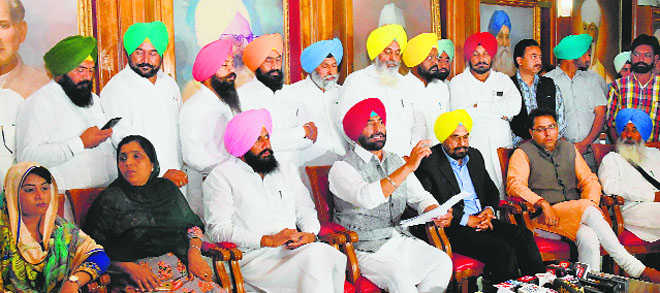
PARTY IN TURMOIL: AAP MLAs along with party members. Tribune photo Manoj MAhajan
Pritam Singh
Professor of Economics, Oxford Brookes University, Oxford
IT may sound odd on the face of it that when I read about the present turmoil in the Punjab unit of the Aam Aadmi Party (AAP) in the wake of AAP supremo Kejriwal's apology to Akali leader Majithia regarding his previous allegations against the latter being involved in drug trade in Punjab, the word that came to mind was 'creative destruction'. Let me explain very briefly the background and meaning of this concept to explain the association that arose in my mind between this concept and this recent political turmoil in Punjab.
This concept was coined by Joseph Schumpeter (1883-1950), a very distinguished political economist of Austrian background, who retired as a professor of economics at Harvard University. Schumpeter tried to explain the nature of progress and decay in a capitalist economy by using this overarching concept. He argued that a capitalist economy thrives economically by constantly destroying old products, technologies, packaging designs, consumption habits and markets etc and replacing them with new products, technologies, designs, consumer styles and markets. He hailed such destruction of the old by the new as creative to differentiate it from the negative destruction where the destruction of what exists leads to escalating destruction. He further went on to say that this process of creative destruction can lead to the emergence of huge monopolies who use their massive economic resources to innovate new products and technologies but end up being so huge and bureaucratic that the creative impulse that is the source of capitalism's economic dynamism eventually dies. He concluded by saying that in a similar manner as a doctor who does not want his patient to die but knows that the patient is going to die, he as a political economist did not want capitalism to die but knew that capitalism was going to die.
As a distant and mild sympathiser of the AAP due to its potential to develop as a third alternative in Indian politics against the BJP (and its Punjab ally Shiromani Akali Dal) and the Congress, I do not want AAP to wither away but can see it moving in that direction. The stunning success of AAP in Punjab during the 2014 General Election when it won four out of the 13 Lok Sabha seats, made it appear as a bigger third alternative in Punjab than it could be in the rest of India.
However, this success, instead of accelerating more political innovations by AAP in Punjab, led to excessive centralised control by the Delhi-based political leadership. The unilateral decision by Kejriwal on the apology to Majithia without consulting the Punjab unit of the party is a continuation of this over-centralised decision-making process. Even if Kejriwal had concluded that his allegations against Majithia had no evidence and that tendering an apology was a morally justified act, this conclusion should have been shared with the Punjab unit and an appropriate mode agreed with the unit should have been evolved to give expression to this decision on apology. This may have been at one level very inconvenient publicly, but it might have initiated an admirably new moral rule in Indian politics that allegations should not be leveled against opponents without evidence. The moral standards in Indian politics have become so polluted that allegations against political opponents are thrown left and right without any evidence and moral responsibility. This leads to public cynicism about the falsehood or truth of many allegations. Such reckless behaviour can only be corrected by open and democratic consultations and discussions within an organisation. Over-centralisation weakens the mechanism of checks and balances over whimsical decisions by the centralised leadership.
All political formations in Punjab suffer, in varying degrees, from Delhi-centric control over their strategies. All Congress leaders of Punjab, including Partap Singh Kairon who is sometimes presented as the tallest Congress leader Punjab has ever produced, have been servile to the central Congress leadership. The Akali Dal was once a genuine regional party of Punjab. It has compromised this status to the over-centralised BJP. The two parliamentary left parties - CPI and CPM - and the BSP also demonstrate lack of autonomy from their Delhi-based central leaderships.
There have been several forms of dissatisfaction erupting at different points against this culture of Delhi-based central control. The emergence of the Punjab People Party, even if it disintegrated later, and the formation of Ludhiana-centric Lok Insaf Party and the work of independent kisan and khet mazdoor organisations are all examples of sporadic and isolated attempts by Punjabis to forge organisational forms that respond to the regional needs of Punjab.
The imminent destruction of AAP can be converted into a creative moment of political regeneration in Punjab.
There is a crying historical need for the emergence of a new Punjab-based regional party. This historical necessity is in tune with the growing clout of regional parties in different parts of India in shaping the contours of Indian politics. Such a regional party in Punjab ought to bring together a range of activists who are not together at the moment but exist in all parties in different degrees.
All political activists aim at some trajectory of their career but at some point in history, the larger goal assumes such importance that individual and the personal goals loose significance. There is a need for broader discussions in the towns and villages of Punjab to initiate a great debate to carve out a development path that is socially just, politically representative and ecologically sustainable. It is out of such critical self-activity that an amalgamation of new and old activists will emerge which will create the architecture of a truly democratic regional party that has the vision and determination to articulate the needed development path for Punjab.



























